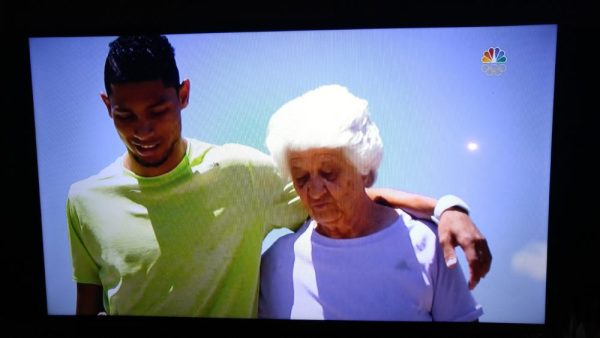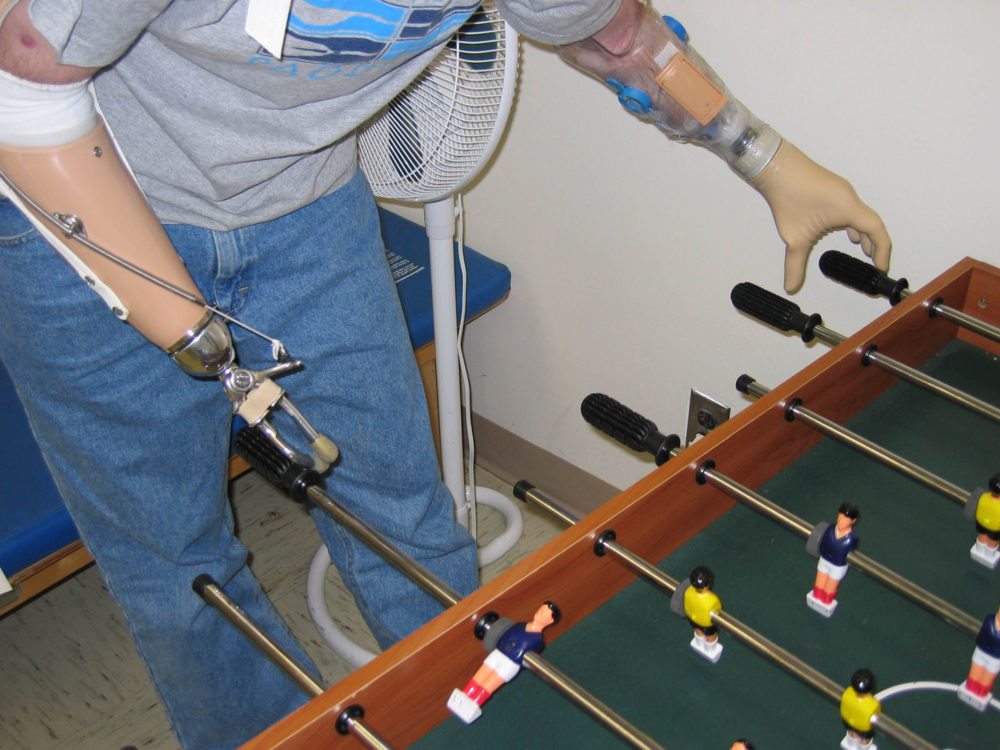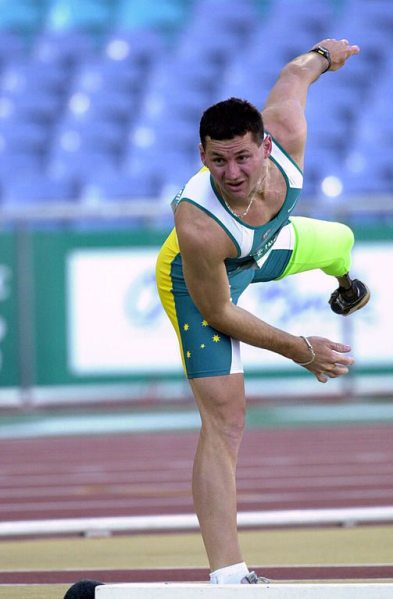
Photo: Wikipedia Commons
The Olympic Games are about stories. Yeah, there’s also that athletic sports angle, but when you really break down the reasons why we watch, a certain percentage of the draw is the personal side of the events. The feel good, ooey gooey stories about the individual athletes.
To fill in time between events, the media does a great job of showcasing the stories behind the athletes. Take for instance a guy named Wayde van Neikerk, from South Africa. He’s not an American. But I rooted for him to win that race anyway.
The day before that race I had never heard his name. A half an hour before that race, I saw a touching story about him put together by the press. He was raised by a track star mother who never got her chance to shine in any important races because of the color of her skin. Apartheid kept her from knowing just how far she could go. Her son inherited some of those lighting fast genes. To make the story even richer, Wayde is coached by a 74-year-old woman whose snapshot might be found under ‘typical grandmother’ in central casting. Her gray hair might be deceiving (and actually prevented her from going down to the track to congratulate him after the race, because security didn’t believe she was a coach), but by taking Wayde under her wing and encouraging him to greatness, she set him up for a life that included flying home from Rio with a gold medal in his carry-on bag.

Photo: Judy Berna
When his race was queued up, I was invested. I couldn’t wait to root for this incredibly fast kid from a country nine thousand miles from my own. I cheered for him, and for the gray-haired woman in the crowd who others might have mistaken for his grandmother.
Despite the hiccups in Rio (can someone say pond water in the diving pool?) these latest Olympic Games were fun to watch and a great way to spend the last few weeks of summer. But the fun is not over. After a bit of downtime to re-organize, it’s almost time for the 2016 Paralympic Games.
I’ve taken it upon myself to be the “Official GeekMom Ambassador to the Paralympic Games.” I’ve written several articles in the past few years about the games. In this post, you get a behind the scenes look at the prosthetists who keep the athletes up and running. I shared how the Paralympics and it’s adaptive technology trickles down to regular amputees (like me!) in this post. In this one, I explain why it’s critically important for you to watch them with your kids. And just one more, a primer of the games and explanation of some of the terms can be found here.
As the years go on, and the interest in adaptive events continues to grow, we have been given more and more access to watch. In years past there has been spotty coverage on very obscure cable channels that no one seemed to actually have. But this year has seen big changes. It was recently announced that Paralympics.org will be live streaming 780 hours of Paralympic Games, including 22 sports. The action begins with the Opening Ceremonies on Wednesday, September 7th. You can also catch many of the events (and record them on your DVR if the hours don’t fit your schedule) on NBCSN. If you don’t know where to find that channel in your area, here is a search page to assist you. And at this link you can find the dates and times they will be broadcasting the games.

Photo: Wikipedia Commons
In case you didn’t click over to my posts from years past, I need to remind you why it’s important (and fun!) to make an effort to watch these games, with your kids by your side. They might be trickier to work into your schedule since school and sports seasons have started, but it will be worth your effort.
I’ve been an amputee for almost 13 years. In that period of time, a lot has changed in the amputee world, concerning not only acceptance in public but interest and intrigue about the hardware I walk around with every day. I regularly have people ask how my leg works and many times they tell me in follow up conversations about an amputee they saw on the news or an amputee they know in their own life. It’s no longer a world where amputees wear long pants year round to hide their prosthetic devices. Part of the reason for that is the huge advancements that have been made in prosthetic technology.
I will never be a super athlete. I will leave the professional sporting events to the younger folks. But even as ‘just’ a mom who is doing her best to keep up with an active life raising four kids, I wear a high tech foot. It’s worth every penny of the eight thousand dollar price tag. It has energy return and just enough rotation that I can navigate uneven terrain better than ever. As much as I love my awesome foot, I am blown away by the technology that will be packed in suitcases, headed to Rio soon.

Photo: Wikipedia Commons
One reason to watch the Paralympics is to stay up to date on what’s out there in the world of prosthetic devices. You’ll see adaptations being made for every sport, from archery to sailing. Have your kids search for the different ways the athletes have made changes to equipment so they can compete in their favorite sport.
Another (huge) reason to watch with your kids is cultural education. Kids are naturally curious. It’s not uncommon for me to be standing in a check-out line at the store and look down to see a small child squatting in front of me, examining my prosthetic leg. The more they see disabled athletes, doing spectacular things, the more they will grow up understanding that different is just different. It’s not weird. In fact, it’s exciting and interesting.
After watching several sports where athletes used adaptive equipment to win their event, suddenly when your child sees a disabled person in the grocery store, it makes sense to them. That person is not an oddity. That person just makes adaptations in their everyday life. When they encounter a child on the playground who is missing a hand, or wearing a prosthetic leg, they are comfortable approaching that new friend. They will have flashbacks to the day they watched that streaming broadcast of an archer, who won a gold medal using his feet to pull on the bow because he had no hands. Variety in human bodies becomes a natural thing.

Photo: Wikipedia Commons
And then there is the reason to watch that mirrors the reason we watch the Olympics themselves – the stories. If you think there are interesting stories to be found in the athletes of the Olympic Games, just you wait. Some of the athletes were born with the disability they bring to the event. Many are military folks, who lost limbs and abilities while serving our country. But many acquired their disability because of some event in their life, some obstacle that they had to overcome.
Every story will be about making peace with what they were given, and hearing the variety of stories can have a way of putting your own life in perspective (even for kids).
One more hint that I covered in a past post that will enhance the experience for your kids. With a couple of weeks left before the Games start, do some research with your child. Pick a few athletes who compete in sports that matter to your family, and do some basic research about the athletes in that sport. Go to their websites. Follow them on Facebook. Get to know them through social media. Then, when it’s time for them to compete, your child is invested. The competition matters on a whole new level.
It won’t be hard to find a sport your family cares about. Pick a sport (at this link) you’re familiar with, like basketball or tennis, or branch out and learn about a new sport, like Goalball or Boccia. Spend some time researching the rules to that sport (heck, use it for a school assignment and it becomes a win-win!).

Photo: Wikipedia Commons
If you want to get your family excited about the Paralympics in the weeks before they begin, I’d suggest you start here. There are videos you can watch together for hours, opening up a whole new world to kids to may not be exposed to the disabled community. Go ahead and click over to Facebook and ‘like’ the page for the Paralympic Games. You will receive almost daily posts filled with interesting facts and information about the Games. You can also subscribe to the Paralympic Games Youtube channel, and catch interesting videos of the sports from years past. And last but clearly not least, immediately click over to this commercial that was made to promote the Paralympic games, and shows many of the inspiring athletes who will compete there.
In the weeks to come I will be sharing stories with you, and updating viewing information. Until then, don’t let the fun of the Olympic Games end in your household. Gear up for a second round of competitions, filled with athletes who have trained just as hard as their able-bodied companions, and had to explore adaptive options too. It’s going to be something you don’t want to miss.



